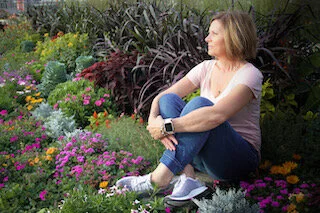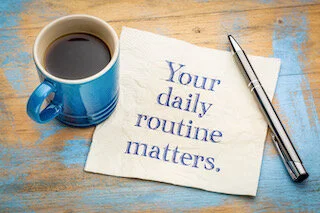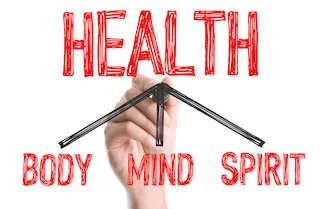Monday, September 23, 2019
welcome to the leADDership brief
A weekly newsletter for creative and innovative people, like you, with ADHD who want timely, helpful, and interesting resources
for leading and living well with ADHD.
Self Care 2.0
In last week’s edition of the leADDership brief was on Self Care: what it is, why you should do it, and how to do it.
As a quick reminder
Self Care is mindfully and intentionally taking the time to pay attention to you and your needs, not out of selfishness or narcissism, rather because taking care of you means you have the bandwidth and energy to care for and attend to others in a healthy and regenerative manner.
Why You Self Care is especially important for adults with ADHD. The emotional, mental, physical, and spiritual energy we exert in order to function in a neuro-typical executive functioning world is profoundly draining. When we aren’t mindfully and intentionally taking care of ourselves we risk exacerbating our ADHD symptoms.
How you Self Care can be simple things like laughter, supportive community, yoga, and time in nature.
And remember, always start with self-compassion by responding to yourself with the same support and empathy you would a good friend or loved one.
For more about this check out last week’s edition here
This week I want to build upon last week’s easy and free self care practices with three Self Care Practices that require a little more time, intentionality, and in some cases, a financial investment.
Once you’ve responded with compassion and empathy to your need for care and support here are three more involved and intentional “How to Self Care” practices to check out and consider.
SLEEP
Good sleep is a crucial part of our physical, emotional, spiritual, and mental well-being. We typically spend about a third of our lives asleep. When our sleep is disrupted beyond the normal fatigue we feel it can aggrivate our ADHD symptoms like focus, energy, and concentration and increase anxiety. Sleep problems are generally quite common and have been reported as one of the most common health conditions in adults with ADHD. Improving sleep quality has the potential to reduce ADHD symptoms and have a positive impact on your everyday life as well as those of your family, friends, and colleagues.
Investing in a sleep hygiene routine that works for you is a Self Care practice that will give you a great return on your investment. Read more about the benefits of sleep hygiene here in the August 12, 2019 edition of the leADDership brief.
You can also download a free copy of my e-book Sleep Hygiene: Create A Routine That Works For You here
Power naps are another Self Care practice to consider. According to Daniel Pink the author of When: The Scientific Secrets of Perfect Timing “A large body of research shows that naps improve cognitive performance and boost mental and physical health. In many ways, naps are Zambonis for our brains. They smooth out the nicks, scuffs, and scratches a typical day leaves on our mental ice.
Naps needn’t be long to be effective. In fact, extremely short naps can give you a boost without creating what biologists call ‘sleep inertia.’”
Check out this downloadable PDF for Pink’s 5-Steps for taking the perfect nappucinno.
STRUCTURE & ROUTINE
Structure and routine may not be the first thing that comes to mind when you think of Self Care, the very words structure and routine sound boring and tedious. They’re the buzz-kill to creativity, spontaneity, and innovation, and adults with ADHD crave the new and sparkly, the novel and fresh.
It’s counter intuitive to our brains with ADHD I know, but vibrant daily routines are essential for adults with ADHD as they provide a framework on which our lives and processes can run more smoothly. Our daily routine matters to our overall sense of well being and satisfaction in life.
I have a love/hate relationship with structure and routine. I naturally resist them as they feel restrictive and “parental” and yet, the truth is, I function much better when I have structure baked into my professional and personal life.
Creating routines for the mundane and tedious things in life means we have the bandwidth and availability to be spontaneous and creative when the opportunity arises. Dr. Hallowell, a foremost expert on ADHD says in his book, Crazy Busy, when you are overwhelmed by a lack of routine and constantly trying to get things done, your “attention is not available to fertilize the egg when the germ of a new idea takes shape.”
Structure and routine hold the space for new ideas and creativity to take place.
Over the years of coaching adults with ADHD and receiving coaching for my own ADHD life I’ve discovered three areas that will make the biggest impact on your life when it comes to routine and structure:
Your morning “get out the door” routine
Meal time routine
Evening sleep hygiene routine
7 IDEAS TO HELP YOU ESTABLISH A ROUTINE THAT WORKS FOR YOU
Pick the routine you want to establish—pick just one! I cannot emphasize this enough. Don’t fall into the ADHD trap of doing it all at once which is a recipe for disaster and overwhelm.
Write down or voice record the routine you’ve chosen
Imagine what this routine would look like, sound like, feel like.
Record, either written or voice notes, everything you can think of that might be a part of this routine. For an example of a morning routine brainstorm and schedule PDF go here
Consider your learning style and strengths and use them to your advantage. For a worksheet on how to use your strengths to your advantage go here
Choose two to three things you can start doing right away. Not next week when you’ve cleaned your bedroom, hall closet, or bathroom. Now.
Figure out how you can do it the easiest way possible with the least amount of steps. See an example here
Create the order you will do the tasks
Create reminders to keep you on track. This can be in the form of sticky notes, voice memos, alarms, white boards, doodles, etc.
Give yourself copious amounts of compassion and empathy and adjust as needed. It’s a great opportunity to use your creative and innovative ADHD brain to tweak and create a system that works for you.
One more thing to consider when it comes to routine: we often have no idea how long any given task, like making the bed or taking a shower, take so it can be very difficult to create a helpful routine when we are unsure of how much time we will need for the routine. I’ve created a time-sheet that you can download here that can help you identify how long tasks actually take.
YOUR HEALTH
Taking care of the “wholeness” of your health: body, mind, emotions, and spirit are essential to Self Care. When your health tank is full you naturally feel better, are more optimistic, see obstacles as opportunities, and have the motivation and desire to perform at your best so that you can show up as your best self professionally and personally.
Here are a few ideas to get you started:
MEDICATION AND SUPPLEMENTS
If you’ve been prescribed meds and/or supplements to help manage your ADHD and the adjacent symptoms it’s vital to your overall well being and ability to thrive in your world that you take your meds as directed by your health care professional.
Work with your doctor and/or psychiatrist to find the prescription or combination of prescriptions that work for you. I’ve had to go back to the doctor several times to get the right dosage as well as the right stimulant for my brain. This is almost universally true for my client base as well. Visit your doctor and/or psychiatrist on a regular basis.DIET
Self Care, when it comes to food is as much about remembering to eat as it is about what to eat (a topic for a future edition). Often adults with ADHD forget to eat on a regular basis, find themselves famished and fatigued mid day, and then binge on carbs, sugar, and caffeine in order to find some energy and focus. It’s a short term solution with no long term benefits. Put alerts on your phone or sticky notes at your desk reminding you to eat. Schedule snack and lunch breaks.
Self Care and food is also about being realistic and compassionate with yourself when it comes to food prep and planning. There are so many options that make everything about food easier: apps, grocery delivery services, meal delivery options, etc. See Brain Foodie Corner for links to apps and services.EXERCISE
ALL the research proves that exercise is good for our well being. Exercise helps us to manage depression and anxiety, affects energy and focus, is key to stimulating dopamine and oxytocin for motivation and inspiration, and helps reduce cortisol and stress. Exercise helps with blood pressure control, weight management, blood glucose levels, and improved sleep. Just a few of the many benefits and reasons why exercise is good Self Care.
This does not have to be a rigorous and time consuming trip to the gym, nor does it require expensive equipment. It doesn’t have to be an elaborate routine. The American College of Sports Medicine (ACSM) recommends that adults should accumulate at least 30 minutes of moderate-intensity aerobic activity 5 days per week OR engage in 20-minutes of vigorous activity 3 days per week.
Studies show that if you aren’t ready for that much exercise the addition of just 10-minutes of movement is beneficial. You can start small and work your way up:Take a brisk, 10-minute walk
Get up from your desk, stretch and march in place for a few minutes
Walk up and down the stairs at work a few times
THERAPY AND COACHING
Hiring a Therapist or a Coach is a financial investment that is worth every penny. If you are fortunate enough to have decent insurance most plans cover a therapist and some HSA or Flex Benefit plans cover ADHD Coaching prescribed by a Psychiatrist or Doctor. I have several clients who pay for coaching through their health saving plans.
Psychology Today defines therapy as “the practice of spending time with a trained professional—usually a psychologist, a social worker, or a licensed counselor—to help diagnose and treat mental and emotional problems, to talk through everyday difficulties, or to seek advice as a couple.”
I like this pared down definition of therapy from Noor Pinna a Talk Space Therapist: “It is a way of changing your perspective on how to handle a situation.”
ADD Coach Academy defines ADHD Coaching as “an ongoing partnership that helps clients live more effective and satisfying lives by deepening their learning, improving their performance, and enhancing their quality of life.”
Therapy is different from coaching in that it focuses on the when and where/how and why and coaching focuses on the what and how/how and when. Both help with cognitive and behavior changes.
Therapy tends to be more past events affecting current events. The therapist is the subject matter expert.
Coaching is present and future focused on goals and changes. The client is the expert in their own life.
Therapist can diagnose, coaches cannot and will not diagnose.
I’ve benefited from both a therapist and a coach over the years. I checked in with a therapist in the past year as I was ready to deal with several issues from my past.
The benefits of therapy and coaching are similar and many:
Improve your time management skill
Improve organizational skills
Reduce impulsivity
Develop better problem-solving skills
Develop strategies for re-framing how you deal with disappointment and perceived failures
Build and nurture your self-confidence and self-compassion
Improve relationships with your family, friends, and colleagues
If hiring a coach or therapist is something you want to add to your Self Care routine I encourage you to interview several coaches or therapists, ask for recommendations, and trust your gut when you meet with a coach or therapist. If it doesn’t feel like the right fit, it probably isn’t.
I would be remiss is I didn’t mention that you can always schedule a complementary coach call with me for the purposes of discovering if coaching is for you. Scroll down to the link to schedule an appointment.
SPIRITUALITY
Nurturing and caring for your spirit is just as important as your body, mind, and emotions. This can be done in all sorts of ways.
If you’re a person of faith a community of faith where you can gather with others for the purpose of growing and developing your faith and your walk with God can be profoundly rich and encouraging. I do know that a formal church setting is difficult for many of my ADHD clients as it’s overly stimulating and/or boring. Find a situation that works for you.
Writing in a journal or using a voice recording app to record your thoughts is another way to nurture your spirit.
Music is especially soothing to the spirit. My iTunes is full of everything from old timey gospel, classical, pop, soft rock, dance, big band, contemporary worship, and 70’s classic rock. All fill my soul depending on the situation.
Meditation, or intentionally quieting your mind and focusing on something that gives you life or peace. I like the Calm app for this. I’ve often used devotionals and the book of common prayers for meditation and focus.
I’d love to hear from you regarding your Self Care practices. Email me at pamelalarson@resetcoach.org or use the comment section below to share your ideas with me and the other readers.
What Else Do You Need To Know?
Coach Pam







